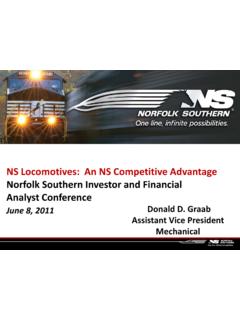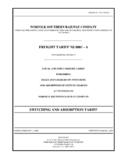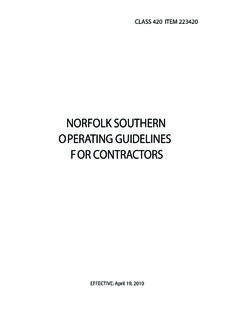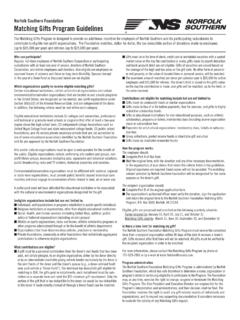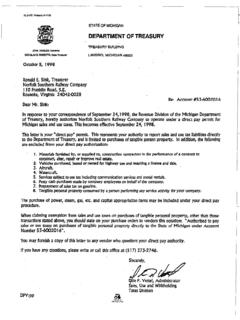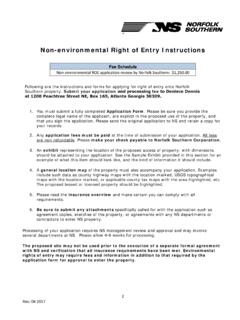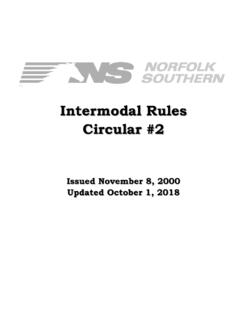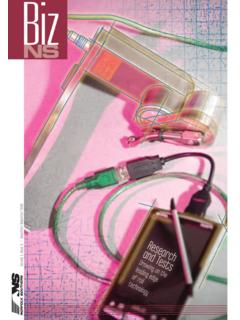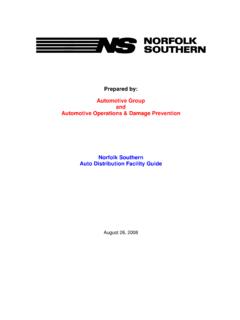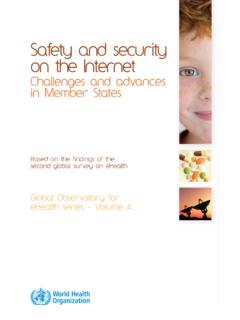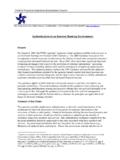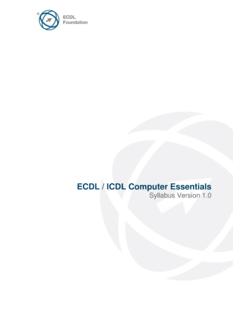Transcription of Norfolk Southern Corporation Computer …
1 Norfolk Southern Corporation Terms and Conditions Governing the Use of Norfolk Southern Corporation Information Technology Assets This document establishes the terms and conditions under which a person ( user ) has access to and makes use of the various information technology assets ( NSITA ) of Norfolk Southern Corporation or any of its subsidiaries or affiliates (collectively NS ). These terms and conditions are taken from and are a portion of the Norfolk Southern Computer Compliance Guide ( NSCCG ). While these terms and conditions govern the access and use of the NSITA by all persons, NS employees and other designated persons remain subject also to the full terms and conditions of the NSCCG. By accessing and using the NSITA, the user agrees to be subject to and comply with the following: I. General All users have a responsibility to protect NS information assets.
2 In addition, all users must comply with all federal, state, and local laws, statutes, and regulations that relate to the control and authorized use of NS Information Technology Infrastructure. Users are authorized access to only the information systems and infrastructure necessary to perform their assigned job duties and to which they have been authorized access by NS. Violations of these terms and conditions are grounds for disciplinary action up to and including termination of employment, civil action, and/or criminal prosecution. NS will also pursue and prosecute, where deemed appropriate, any user who accesses or uses, or attempts to access or use, any NSITA (including, but not limited to, any NS Computer , Computer system, application, communications system or network) without proper authorization.
3 Users entering the NSITA will be presented with a click agreement and warning/notice banner. Users must agree to the terms and conditions specified in the banner before being granted access. Clicking past the banner constitutes agreement to all specified terms and conditions of usage set out in this document. II. Passwords Regardless of the circumstances, passwords must never be shared or revealed to anyone. This includes sharing passwords of other users. In the event a user suspects his/her password is compromised in any way, the user should immediately change the password and notify his/her supervisor, manager, SPOC and NS Information Security. Any user must not configure or program any computing device or software package to avoid manually entering their password. Users should choose passwords that cannot be easily guessed.
4 Passwords should not be related to the user s ID, job or personal life. For example, a car license plate number, a spouse s name, an address, proper names, places, and slang should not be used. Users should not construct passwords that are identical or substantially similar to passwords that they have previously employed. Users should not construct passwords made up of a certain number of characters that do not change combined with a certain number of characters that predictably change. For example, users should not employ passwords like X34 JAN in January, X34 FEB in February, etc. Norfolk Southern S User Acceptance Terms and Conditions Page 2 Users should memorize their passwords and should not record them in any manner. Users must ensure that individual authentication information, such as user IDs, passwords, tokens, and smart cards, are not disclosed to or used by any other person.
5 Users must immediately change passwords to systems if compromise is suspected, and notify the Security Point of Contact (SPOC) or the NS Information Security Department. III. Security Users must comply with all controls established by the information asset owner. Users must use information only for the purpose intended or expressly permitted by the information asset owner. Degaussing will be used to render information unreadable on magnetic storage devices that are to be reused. Electronic media not planned to be reused or sold must be physically destroyed, rendering the media unusable and effectively preventing the sensitive information from being extracted. Users must ensure that terminals, PCs, or workstations are disabled from unauthorized use. This means that users must log out of or lock systems when machines are left unattended.
6 During off-duty hours, users should log off unless there are processes running on the system, in which case, the system must be locked. In some instances a terminal, PC, or workstation in a restricted area may need to be left in non-logged off and non-locked status. The department that has such a need should obtain a variance from NS Information Security. Users must immediately report suspected security violations to their supervisor, Security Point of Contact (SPOC), NS Information Security, or Internal Audit. Users should not open suspicious programs or e-mail attachments from any source. IIII. Restricted or Confidential Information Users must not disclose or release to any third party individual or organization any information or data unless such disclosure is authorized as part of the job responsibilities of the user.
7 Furthermore, users must ensure that RESTRICTED or CONFIDENTIAL information (collectively RESTRICTED information ) is not disclosed to unauthorized individuals without the permission of the information asset owner. No user may have access to RESTRICTED information without the express permission of the information asset owner. Users who accept custodial responsibilities of RESTRICTED information, regardless of the media or presentation method, must safeguard the use and storage of that information. This includes protecting information from unauthorized viewing or physical access. Transmissions of RESTRICTED information over non-NS networks, such as the Internet or other public networks, must be encrypted. All users are responsible for the proper disposal and destruction of RESTRICTED information regardless of the media containing the information.
8 RESTRICTED printed information must not be placed in ordinary wastebaskets for disposal. This information must be accumulated and shredded. Shredding may be accomplished on a local, departmental, building, or other basis. Transmitting any RESTRICTED information via electronic communications outside the company is prohibited. Users having a business need to transmit such information must secure prior approval from NS Information Security. Norfolk Southern S User Acceptance Terms and Conditions Page 3 V. Prohibited Transmissions or Content/Emails Users of the Norfolk Southern e-mail systems are strictly prohibited from: o Sending electronic chain letters. o Sending or intentionally receiving harassing, offensive, or obscene messages or material (such as pictures or cartoons). o Concealing or misrepresenting their (or anyone else involved) identities.
9 Users are prohibited from sending anonymous (unsigned) mail or from altering the ID on sent mail (spoofing). o Making improper solicitations. o Intercepting, accessing, or reading another user's e-mail, subject to the exception of users designated by corporate management to perform monitoring. o Using e-mail to disseminate rumors or false or misleading information. o Forwarding e-mail without legitimate business purpose. o Using profane, abusive, scandalous, or threatening language in e-mail. o Bypassing e-mail security mechanisms. o Automatically forwarding e-mail to other external systems, unless approval is granted by a security variance. All e-mail transmissions or receptions are subject to monitoring by authorized NS users. All persons who access NS information systems must expect no privacy relative to the sending or receiving of electronic communications.
10 All transmissions may be monitored and reviewed by authorized users at any time without notification. However, NS does not regularly monitor the content of electronic communications unless a legitimate business reason requires such an effort. Users must conform to all NS corporate policies and procedures in their use of e-mail. NS reserves the right to terminate a user's e-mail access at any time, or to deny access to users who do not have a legitimate business need for such. Any user posting messages to Internet discussion groups, internet relay chat, electronic bulletin boards, or any other public information system that is not authorized by NS to do so on its behalf must indicate clearly that these comments do not necessarily represent the position of NS. VI. Software All software must be properly licensed.
